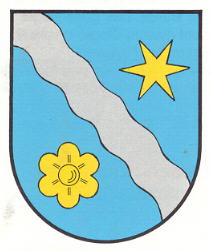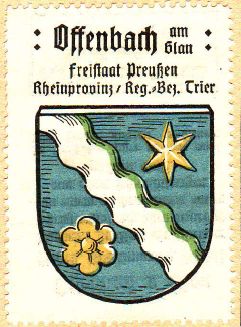Offenbach (Kusel): Difference between revisions
Jump to navigation
Jump to search
Knorrepoes (talk | contribs) m (Text replacement - "Literature" to "Literature") |
Knorrepoes (talk | contribs) m (Text replacement - "====Official blazon==== " to "====Official blazon==== (de) ") |
||
| Line 10: | Line 10: | ||
====Official blazon==== | ====Official blazon==== | ||
(de) | |||
====Origin/meaning==== | ====Origin/meaning==== | ||
Offenbach received city rights in 1330 from Emperor Ludwig of Bayern. The oldest seals of the city date from the late 15<sup>th</sup> century and already show the arms. The wavy bend is a canting symbol (Bach=stream). The star most likely was a symbol of the local court. The meaning of the rose is not known. | Offenbach received city rights in 1330 from Emperor Ludwig of Bayern. The oldest seals of the city date from the late 15<sup>th</sup> century and already show the arms. The wavy bend is a canting symbol (Bach=stream). The star most likely was a symbol of the local court. The meaning of the rose is not known. | ||
Revision as of 15:20, 2 June 2017
This page is part of the German heraldry portal Deutsche Wappensammlung |
Heraldry of the World |
|
German heraldry:
|
Selected collector's items from Germany:
|
OFFENBACH
State : Rheinland-Pfalz
District (Kreis) : Kusel
Incorporated into : 1969 Offenbach-Hundheim
Official blazon
(de)
Origin/meaning
Offenbach received city rights in 1330 from Emperor Ludwig of Bayern. The oldest seals of the city date from the late 15th century and already show the arms. The wavy bend is a canting symbol (Bach=stream). The star most likely was a symbol of the local court. The meaning of the rose is not known.
| The arms by Hupp in the Kaffee Hag albums +/- 1925 |
Contact and Support
Partners:
Your logo here ?
Contact us
© since 1995, Heraldry of the World, Ralf Hartemink 
Index of the site
Literature : Debus, 1988













